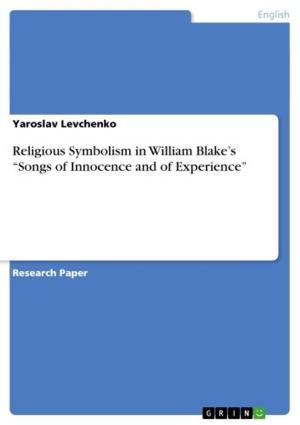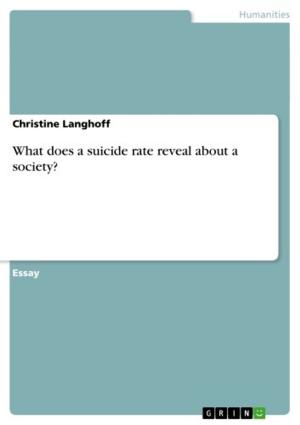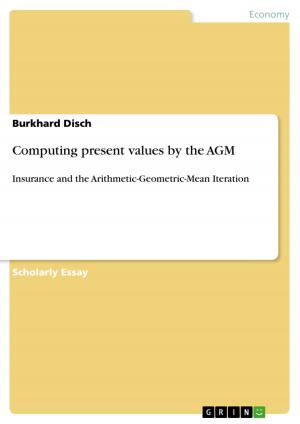Marvell's 'Horatian Ode' as a Political Poem
Fiction & Literature, Literary Theory & Criticism, British| Author: | Stephanie Fuchs | ISBN: | 9783638315302 |
| Publisher: | GRIN Publishing | Publication: | October 14, 2004 |
| Imprint: | GRIN Publishing | Language: | English |
| Author: | Stephanie Fuchs |
| ISBN: | 9783638315302 |
| Publisher: | GRIN Publishing |
| Publication: | October 14, 2004 |
| Imprint: | GRIN Publishing |
| Language: | English |
Seminar paper from the year 2004 in the subject English Language and Literature Studies - Literature, grade: very good, University of Graz (Anglistics/American Studies), 12 entries in the bibliography, language: English, abstract: The relationship of poetry to history is a most important one, since poems arise out of the process of history and are written by men who are living in that process. Andrew Marvell's Horatian Ode upon Cromwell's Return from Ireland undoubtedly is a poem of great artistry, but above all it provides an excellent example for political poetry of seventeenth century Great Britain. Since Marvell's poem deals with historical figures and comments on a historical occasion, there is a temptation to see the poem merely as a historical document. But while it is generally recognized that the poem provides a historical account of the period, it is indeed quite complex and by no means free of political judgement. As Brooks and Warren put in their essay on the poem, 'distinguishing between a poem as a work of art and a poem as a historical document seems necessary in order to explore the intimate relationship between them' (1950). While the prosodic majesty and metrical poise of Marvell's poem has sustained universal acclaim among critics, the attention of most students of Marvell's Horatian Ode has been directed towards questions about the political ideologies expressed in the poem. We know that Marvell was not only a poet but also a political figure, but there is still no real consensus as to what Marvell's political attitudes were 'really' like. The ambiguous political views and attitudes Marvell held throughout his lifetime seem to correspond with the political ambiguity in the Horatian Ode. Critics such as David Norbrook argue that the Horatian Ode 'clearly expresses great political commitment to Oliver Cromwell' (1990), while other interpretations stress that the Ode is quite explicit in its Royalist bias. Based on these readings, the question arises whether assuming that Marvell approves or disapproves of Cromwell in an ultimate sense would not mean to over-simplify the meaning of the poem. In the following paper, I will attempt to find out about the poem's engagement with the politics of its moment, the summer of 1650. I want to approach the Horatian Ode by means of an excursus devoted to the manner in which Marvell reflects on the historical occasion of Charles's beheading and Cromwell's subjugation of Ireland. Specifically, I will attempt to show that the poem expresses a highly ambivalent and ironic attitude, and that both Royalist principles and admiration for Cromwell's achievements are present in the poem.
Seminar paper from the year 2004 in the subject English Language and Literature Studies - Literature, grade: very good, University of Graz (Anglistics/American Studies), 12 entries in the bibliography, language: English, abstract: The relationship of poetry to history is a most important one, since poems arise out of the process of history and are written by men who are living in that process. Andrew Marvell's Horatian Ode upon Cromwell's Return from Ireland undoubtedly is a poem of great artistry, but above all it provides an excellent example for political poetry of seventeenth century Great Britain. Since Marvell's poem deals with historical figures and comments on a historical occasion, there is a temptation to see the poem merely as a historical document. But while it is generally recognized that the poem provides a historical account of the period, it is indeed quite complex and by no means free of political judgement. As Brooks and Warren put in their essay on the poem, 'distinguishing between a poem as a work of art and a poem as a historical document seems necessary in order to explore the intimate relationship between them' (1950). While the prosodic majesty and metrical poise of Marvell's poem has sustained universal acclaim among critics, the attention of most students of Marvell's Horatian Ode has been directed towards questions about the political ideologies expressed in the poem. We know that Marvell was not only a poet but also a political figure, but there is still no real consensus as to what Marvell's political attitudes were 'really' like. The ambiguous political views and attitudes Marvell held throughout his lifetime seem to correspond with the political ambiguity in the Horatian Ode. Critics such as David Norbrook argue that the Horatian Ode 'clearly expresses great political commitment to Oliver Cromwell' (1990), while other interpretations stress that the Ode is quite explicit in its Royalist bias. Based on these readings, the question arises whether assuming that Marvell approves or disapproves of Cromwell in an ultimate sense would not mean to over-simplify the meaning of the poem. In the following paper, I will attempt to find out about the poem's engagement with the politics of its moment, the summer of 1650. I want to approach the Horatian Ode by means of an excursus devoted to the manner in which Marvell reflects on the historical occasion of Charles's beheading and Cromwell's subjugation of Ireland. Specifically, I will attempt to show that the poem expresses a highly ambivalent and ironic attitude, and that both Royalist principles and admiration for Cromwell's achievements are present in the poem.















